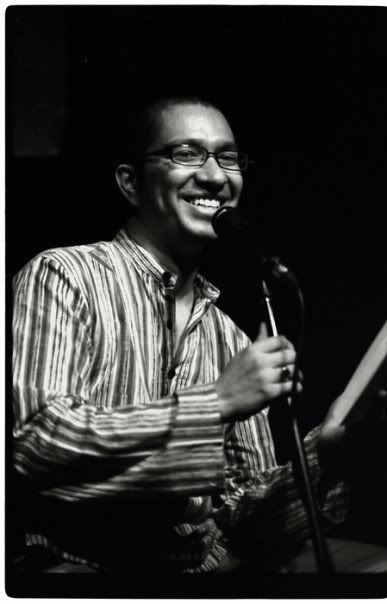From South China Morning Post (Hong Kong)
Director isn't shy about the big picture
by Clarence Tsui
South China Morning Post, 13 April.
Amir Muhammad was more surprised than anyone when his documentary The Last Communist passed Malaysia's film censors without cuts last month.
Given that its subject matter, former communist leader Chin Peng, is still persona non grata in the country, it was an achievement that the film made it to general release. The 90-minute documentary, which will be screened tomorrow as part of the Hong Kong International Film Festival, tells the story of the man who led ethnic Chinese Malaysians in a guerrilla resistance against the Japanese invaders during the second world war.
Despite the decades that have passed, attitudes towards both him and the struggle remain complex to this day, Muhammad said.
"People's attitudes towards Chin Peng varied, of course, according to how close they were to the events of that era," he said, referring to the period from 1948 to 1960 when authorities wielded power to arrest dissidents in the face of what they saw as a communist-led uprising. "But it's safe to say that there was actually a sneaking sense of pride that their town or their family had been somehow involved in such a dramatic struggle."
What sets The Last Communist apart from other documentaries is the way it unravels Mr Chin's story. It traces his travels across Malaysia, interviewing people from places where he lived, worked and fought, while also offering glimpses into the struggles of their lives today.
In what is billed as a "semi-musical documentary", The Last Communist weaves interviews with performances of revolutionary songs, from Bollywood to ballads.
It ends with the filmmaker taking the camera across the border into Thailand, where Mr Chin and his fellow members of the Communist Party of Malaya have lived since the 1950s, when talks between the communists and the dominant party in the ruling coalition, the United Malay National Organisation party, broke down.
"They are hale and hearty, and had far greater energy than our own film crew, who were each about half their age." Muhammad said. "They still have their ideals but they have reconciled themselves to their place in history. I didn't sense any great bitterness that Malaysia didn't go the socialist path.
"Quite a few wanted to go back, if just to see their old towns, but the Malaysian government will not allow them."
A filmmaker who has never shied from tackling political issues, Muhammad has examined social discontent in Malaysia with The Big Durian and political reformation in Indonesia with The Year of Living Vicariously - but The Last Communist, shot on digital video for less than US$15,000, is his most controversial.
Rather than simply paying homage to Mr Chin, Muhammad said it was the "landscape" he was interested in examining and the lingering social problems that could have served as the driving force for Mr Chin's struggle in the 1950s and 60s.
by Clarence Tsui
South China Morning Post, 13 April.
Amir Muhammad was more surprised than anyone when his documentary The Last Communist passed Malaysia's film censors without cuts last month.
Given that its subject matter, former communist leader Chin Peng, is still persona non grata in the country, it was an achievement that the film made it to general release. The 90-minute documentary, which will be screened tomorrow as part of the Hong Kong International Film Festival, tells the story of the man who led ethnic Chinese Malaysians in a guerrilla resistance against the Japanese invaders during the second world war.
Despite the decades that have passed, attitudes towards both him and the struggle remain complex to this day, Muhammad said.
"People's attitudes towards Chin Peng varied, of course, according to how close they were to the events of that era," he said, referring to the period from 1948 to 1960 when authorities wielded power to arrest dissidents in the face of what they saw as a communist-led uprising. "But it's safe to say that there was actually a sneaking sense of pride that their town or their family had been somehow involved in such a dramatic struggle."
What sets The Last Communist apart from other documentaries is the way it unravels Mr Chin's story. It traces his travels across Malaysia, interviewing people from places where he lived, worked and fought, while also offering glimpses into the struggles of their lives today.
In what is billed as a "semi-musical documentary", The Last Communist weaves interviews with performances of revolutionary songs, from Bollywood to ballads.
It ends with the filmmaker taking the camera across the border into Thailand, where Mr Chin and his fellow members of the Communist Party of Malaya have lived since the 1950s, when talks between the communists and the dominant party in the ruling coalition, the United Malay National Organisation party, broke down.
"They are hale and hearty, and had far greater energy than our own film crew, who were each about half their age." Muhammad said. "They still have their ideals but they have reconciled themselves to their place in history. I didn't sense any great bitterness that Malaysia didn't go the socialist path.
"Quite a few wanted to go back, if just to see their old towns, but the Malaysian government will not allow them."
A filmmaker who has never shied from tackling political issues, Muhammad has examined social discontent in Malaysia with The Big Durian and political reformation in Indonesia with The Year of Living Vicariously - but The Last Communist, shot on digital video for less than US$15,000, is his most controversial.
Rather than simply paying homage to Mr Chin, Muhammad said it was the "landscape" he was interested in examining and the lingering social problems that could have served as the driving force for Mr Chin's struggle in the 1950s and 60s.


0 Comments:
Post a Comment
<< Home